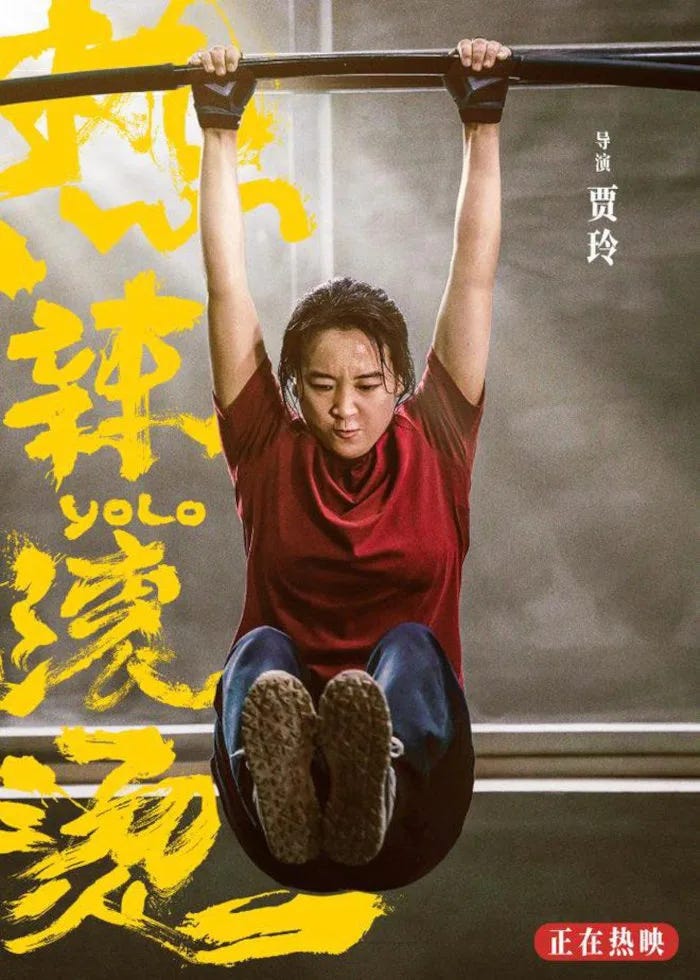Seven Wisdoms from Chinese Movie "YOLO"
Unpacking what "You Only Live Once" really means.
This article is a continuation of a LinkedIn post I had written here.
I recently caught this movie at the theatres, and cried buckets.
About the Movie
《热辣滚烫》 (rè là gǔn tàng) tells the story of Du Le Ying finding passion in boxing and losing an incredible 100 pounds along the journey.
The main actor and director of the film is Jia Ling, a comedian from China well-loved for her chubby outlook, bubbly persona, and comedic talent. Her real-life transformation to a healthier physique over less than a year was documented via the film and shocked many.
To me the movie was not so much about weight loss. Le Ying struggled with her lacklustre life and having her innate kindness taken advantage of by her loved ones. She found life to be purposeless and pointless, yet she desperately craved love and acceptance, to the point of losing her self-worth.
In one memorable scene where Le Ying was having lunch with her dad, she asked him:
“If you had a big apple and a small apple, and your friend really wanted one, which would you give?”
Her father replied, “If it were my friend, I would of course offer the bigger one. What about you?”
Le Ying smiled and said, “I would give both.”
“Well, then my daughter must have many friends,” he replied.
Le Ying went quiet for a while and said: “Not really. My friends believe I don’t like apples.”
Before her transformation, Le Ying knew no boundaries with her kindness. She lived for the approval and acceptance of others. Boxing not only made her physically stronger, it also changed the way she viewed her own existence.
The hardcore training and her first boxing competition brought so much pain to her body, but that physical pain must not have hurt her more than choosing to remain where she was in life.
So, the movie wasn’t so much about boxing, either. In the final scene where she met the man she once fell head over heels for, she said no to him while preserving her kindness. For the first time she chose herself over others and learned to live on her terms.
The movie title was translated in English to “YOLO”, for “You Only Live Once”. I interpret this as seeing that we have no time to lose, if we want change.
This is a fantastic production in my opinion - sincere, humorous, and emotionally uplifting.

Here are seven pieces of wisdom I’ve picked from the movie, which I hope will serve as timely reminders for us in our journey of personal transformation and taking greater ownership of our own lives:
1-【不要责怪过去的自己,他当时站在雨里也很迷茫。】
“Don’t blame your past self - she must have felt so lost standing in the rain.”
We have a tendency to berate ourselves for what we had or had not done.
We develop strong feelings of shame and aversion towards our past self, and consequently, our current self.
Our head may tell us that this judgement is pointless since we cannot turn back the clock, but the heart desperately wishes that we had behaved differently or made better decisions and choices.
Please know we must have done our very best in those circumstances we were given.
We made those “bad” choices back then simply because they made us feel safe. We thought crouching under a barely comfortable shelter was better than strutting outside with a trusty umbrella, or even dancing in the rain.
We just didn’t have the courage and wisdom that we needed and have today.
It was unfortunate, but it wasn’t our fault.
2-【变好的过程都不太舒服,试试再努力一点。】
“The journey to becoming better will always feel uncomfortable, so let’s try and work a little harder.”
The only way for a lobster to grow is to break out of its old shell. This process is risky and makes the lobster feel vulnerable, but it knows that the discomfort is what allows it to grow bigger and become stronger.
There will be times when change feels really painful and makes us want to hold back or give up.
Staying where we are is certainly an option, but it just doesn’t move the needle in helping us become better.
This nugget of wisdom reminds us that facing our discomfort is the rite of passage to real growth, and encourages us to forge ahead one step at a time.
3-【对未来最大的慷慨,是把一切献给现在。】
“The most generous thing you can do for your future, is to give your all to the present.”
When we envision what a better future looks like for ourselves and it all seems impervious and unattainable, we might feel crippled by just how much we have to do to get there, and be tempted to remain on fantasy mode.
Instead of dwelling on what we may not be able to achieve, we should focus on what we can do right here, right now, and most importantly give it all we’ve got.
Because fundamentally what we actually do in the present will influence and make a difference in how the future unfolds.
For Le Ying, successfully shedding 100 pounds and winning a boxing match may have seemed really far away, but she decided that every piece of weight she lifted, every mile she ran, and every punch she threw would play a part in taking her closer to her dream.
So all she needed was to give her very best to each new day that came.
And slowly but surely, her future arrived.

4-【命运只负责洗牌,出牌的永远是自己。】
“Destiny is only responsible for shuffling the cards; we are the ones playing them.”
Taking ownership of our life can be a tricky business.
We want complete autonomy, and yet we can’t have it, because we are often bound by the conditions we are given. The inability to control everything can make us feel helpless.
We attribute our successful attempts to luck, and failures to fate.
But learning to accept the cards we are dealt does not mean that we passively await external forces to direct our life.
We have the freedom to determine how we play those cards - even when we are dealt a really bad hand.
It is ultimately up to us to decide how we want to show up and navigate our circumstances.
Le Ying almost completely gave up on herself after having her heart broken over and over again by her loved ones.
But she saw that the opportunity for a way out of her desolate life has always been there, quietly waiting for her. And she took it.
5-【为了赢,我想拼一次!】
“In order to win, I’d like to fight once!”
Le Ying had a refreshing perspective and approach towards winning.
She took up the sport because she was fascinated by watching how two boxers in a fight could hug each other so graciously at the end of an intense battle - regardless of who had won the match.
Winning to her wasn’t about competing with someone else and proving to be the stronger or better person.
Here I have simplistically translated the Chinese word “拼” (pīn) as “fight” to align with the context of the movie. More accurately, “拼” has connotations of “giving our very best” and “to go all out” with something.
Winning to Le Ying was more about overcoming her past and emerging as a new person in the process. And she knew this was only possible if she gave her very best and fought for what she truly desired - transformation.
6-【不是每一次跌倒都能爬起来,但每一次尝试都值得尊重。】
“We may not successfully get up every time we fall, but every attempt is worthy of respect.”
During her first boxing match, Le Ying was punched to the ground multiple times. And each time she fell, as best as she could, she tried to get back up on her feet.
Every time she managed to stand up to face her opponent again, she realised how strong and resilient she could be.
Winning the match was no longer that important, she realised. Nor did she need cheering and validation from others.
What her life was missing all long was self-respect.
7-【一切都来得及,记得爱自己!】
“It’s never too late to love yourself!”
In the movie, Le Ying shared:
“我以为想得到拥抱,只有对人好才行。” (I thought that if I wanted a hug, I had to be nice to people.)
All of her life, this was her strategy. In the process of seeking external love and acceptance, she gave up her own wants and needs, to the extent of losing herself in the life and identity of others.
Her endeavour in boxing changed everything.
Right after her match, she took her first ever selfie and posted it on social media for the very first time. It was a raw, unfiltered shot of her - bruised and battered, with a big, contented smile on her face.
Le Ying’s story taught us that it really is never too late to love ourselves, no matter how old we are and at which stage of life we are at.
Which nugget(s) of YOLO wisdom do you resonate with the most?












Nian- Thanks for sharing this. I love the apple analogy. But I love her answer to the need to have many friends. Most of all, I love that now I have a movie that I can add to my list of must-watch. :) Hope you're well-
Love this one >>
“The most generous thing you can do for your future, is to give your all to the present.”
The sentiment of focusing on the present to shape the future is profound and often underestimated. Le Ying's story beautifully illustrates the power of consistent effort and dedication towards a goal, no matter how distant it may seem.
One insight that emerges from Le Ying's journey is the importance of incremental progress. Often, when faced with monumental goals, we can feel overwhelmed and demotivated by the sheer magnitude of what lies ahead. However, breaking down the journey into smaller, manageable steps not only makes it more achievable but also allows us to celebrate the progress along the way. Each pound shed, each mile run, and each punch thrown represented a victory in itself for Le Ying, reinforcing her commitment and fueling her determination to continue.
"A journey of a thousand miles begins with a single step"